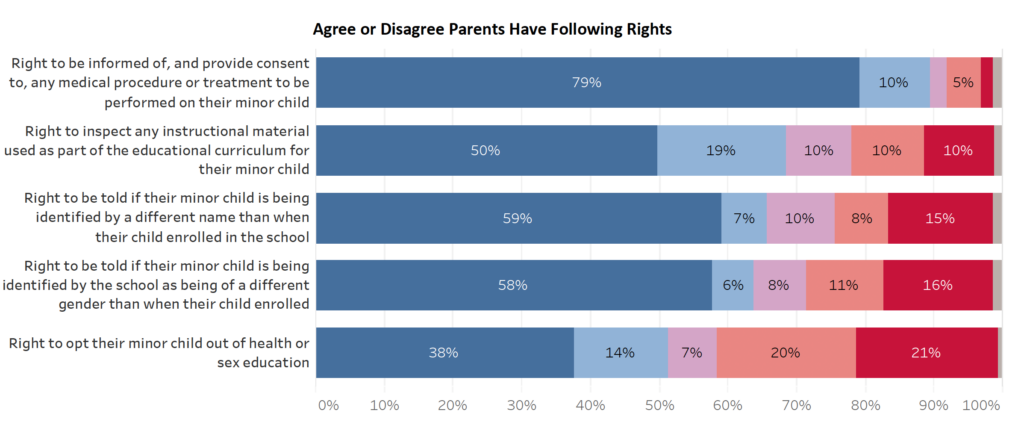A new University of New Hampshire poll finds Granite Staters overwhelmingly support parents’ rights to know what their children are doing at school, including if they are using a different name or identifying by a gender different from their biological one. It’s the second poll in a month finding support for the right of parents to be directly involved in their child’s at-school education.
At the same time, Granite State voters are split on the concept of a “Parents’ Bill of Rights,” thanks to overwhelming opposition from Democrats. The party’s leadership, both in the legislature and at the state party, have said New Hampshire parents are too dangerous to be informed about their children’s behavior.
Parents of school-aged children disagree. The new Granite State Poll, a States of Opinion Project conducted by the University of New Hampshire Survey Center, found voters are split on whether they generally support a “Parents’ Bill of Rights” (41 to 39 percent). But among parents with children in the household, support for the legislation is an overwhelming 58 to 22 percent.
“Look at these numbers among parents. They support this bill nearly three to one and this bill is about their parents,” said Sen. Jeb Bradley (R-Wolfeboro). “Parents love their kids, and we’re on their side.”
Meanwhile, the specific elements of the legislation have broad support from Granite Staters across the board, including the policy Democrats have made the center of their opposition.
Asked if a parent “has the right to be told if their minor child is being identified by the school as being of a different gender than when their child enrolled,” 64 percent of Granite Staters said yes, while 27 percent said no.
They also agreed that parents have the right to know if their child “is being identified by a different name than when their child enrolled in the school,” 66 percent to 23 percent.
By a 69 to 20 percent margin, voters believe parents have the right to inspect the instructional material used in their kids’ schools. And an overwhelming 89 percent agreed that “a parent has the right to be informed of, and provide consent to, any medical procedure or treatment to be performed on their minor child.
“A proper headline for this poll would have been: New Hampshire parents overwhelmingly support parental rights on a bipartisan basis,” said Adam Waldeck with 1776 Action. “All the key policies included in this bill are massively popular – the right of parents to have a final say on curriculum and health decisions, and the right to know about sex and gender issues in the classroom.”
“The radical activists yelling about this bill being extreme seem to be driving the discussion because our country seems addicted to outrage. But we would hope that New Hampshire legislators see them from what they are – a fringe minority,” Waldeck added.
“Codifying the rights of parents is popular with liberals, moderates and conservatives. Period.”

Asked why voters might be evenly split on “The Parents’ Bill of Rights” but overwhelmingly support the issue, UNH polling director Andy Smith quipped, “Marketing is key in modern politics. Think the ‘Inflation Reduction Act!’
“The public is poorly informed about many, if not most issues, (so) political leaders are more apt to look for shorthand names to attack or support complicated policy proposals than to explain the details to voters,” Smith added.
Perceptions of the legislation have also been shaped by hostile media coverage from partisan sources like NHPR and The Boston Globe. As a result, while independents support the “Parents’ Bill of Rights” 45 to 27 percent, Democrats oppose it 71 to 6 percent.
And House Republicans didn’t help when they scheduled hearings on unrelated legislation on gender reassignment surgery for minors for the same day as the “Parents’ Bill of Rights,” helping opponents’ efforts to muddy the issue.
The UNH findings mirror those of an NHJournal/coefficient poll released last month, which found Granite Staters supported parents having the final say on their kids’ education by a 59 to 32 percent margin. When NHJ asked the question about disclosing behavior at school related to sex and gender, 78 percent supported a parent’s right to know. That included 83 percent of independents and 61 percent of Democrats.



